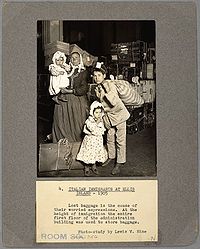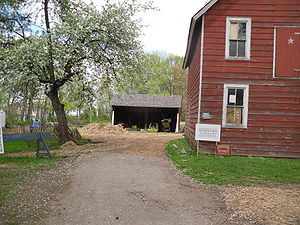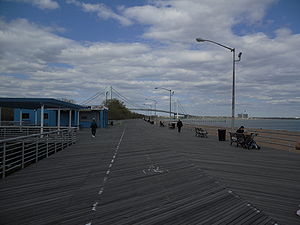From The Peopling of New York City

Italian American Contributions to Staten Island

An Italian Immigrant Family at Ellis Island. Image from NYPL.
Staten Island is composed of people from many different ethnic backgrounds, but the Italian people more than any other ethnic group have defined Staten Island. As of 2008, 34.8% of the people on Staten Island were of Italian descent. Richmond County (Staten Island) has a higher percentage of Italian Americans than any other county in the United States. An Italian named Christopher Columbus, was credited with the European discovery of America. Columbus’ discovery would change the entire world because his arrival touched off an explosion of interest in America. Columbus paved the way for the Italian culture to be transplanted, grow and thrive in America. Many years later Columbus’ fellow Italians would have a similar influence on Staten Island. Columbus’ descendants are responsible for the Italian flavor that resonates throughout Staten Island, or should I say “Columbus Island.”
Why did Italians decide to settle on Staten Island?

Staten Island Farms. Photo courtesy of John Troino.
Italian Americans were drawn to Staten Island for many reasons. Three quarters of Italian emigrants originally lived in rural areas. In the past Staten Island was very rural and land was relatively cheap. This gave Italians a chance at familiar employment. South Beach on Staten Island was also a major tourist destination. For more information of Staten Island Beaches, visit A Walk On The Beach This tourist attraction led to the establishment of shops and restaurants, which required cooks. Many Italians were proficient cooks and took advantage of the economic opportunities offered in Staten Island. More recently, another reason Italians came to Staten Island was the Verrazanno-Narrows Bridge. The bridge made Staten Island much more accessible to Italian Americans living in Brooklyn and made commuting to the other boroughs easier. Italian Americans were also drawn to Staten Island by the many community organizations that were set up on the Island as early as 1882 (The Knights of Columbus). For more information on why people choose Staten Island as their residence, see Over The Verrazano
Another reason Italians came to Staten Island was its relative racial homogeneity compared to the other Boroughs of New York City. Italians who came to Staten Island had faced predjudices in both Italy and America. Prior to the 1800's Italy was split into independent cities. After the Italian unification the North and South (traditionally quite distinct) found themselves as part of one country. The North was substantially more industrialized and had higher levels of education and the areas South of Rome (the Mezzogiorno) faced substantial prejudice from the North. This was a major cause of the Italian diaspora when more then 25 million Italians left Italy. Here in the United States, anti-Italian feels were high. Twelve Italians were lynched in New Orleans in 1891. On the east coast during World War II, many Italians were forced to register as "enemy aliens." Several fishermen on Staten Island were forced to give up their boats. This combination of racism faced both at home and in the new country produced a community of Italian Americans very sensitive to race and to other groups.

South Beach. Photo courtesy of John Troino.
Italian Contributions To Staten Island
The Italian culture has had a tremendous impact on Staten Island. The most famous contribution to Staten Island by the Italians is of course food! You can find many exquisite Italian restaurants throughout Staten Island. The most popular Italian dish by far is pizza. When you are hungry on a hot summer day there are two places you must visit. First, enjoy the pizza of Denino’s. Then walk across the street to relish in the world’s greatest ice at Ralph’s Famous Italian Ices. These places offer some of the best Italian food on the island and have become staples of Staten Island.

Vegetable Lasagna with Red Pepper Sauce. Photo courtesy of
teamsugar.com.
Italians have had a major impact on the arts of Staten Island. Snug Harbor has become a center for Italian artists. Construction recently began on an $8,000,000 “Museo Italia,” for the main hall of the Snug Harbor Cultural Center. This center will become a showcase for Italian Art. Italians have also shaped the architecture of Staten Island. Italian architect Eugene DeRosa designed one of the most famous buildings on Staten Island. He designed the famous St. George Theatre. Italians brought their music and dance styles to the island and made donations to Shakespeare companies on the island.
Italians on Staten Island take pride in their heritage. This pride led to the establishment of an Italian Center For Migration Studies on Todt Hill. It has also led to the establishment of Italian social clubs. These clubs include the Italian Club of Staten Island Foundation, Inc. and the American Committee on Italian Migration. Both of these clubs provide vital help for those in need on Staten Island. They run food drives and provide scholarships.
There are many famous Italian Americans from Staten Island. Alyssa Milano grew up in Great Kills. She played opposite Tony Danza in Who’s the Boss? Frank Lombardi, a former New Springville resident, was an actor on As the World Turns, The Guiding Light, and All My Children. He was the head writer for the show The Nanny. Joseph Berardi, a Huguenot resident, was a famous bowling champion. He went on to win a total of 13 PBA titles. World famous interior designer Mario Buatta was born in West Brighton. Musician Frank LaRocka, also from West Brighton, went on to play with Bon Jovi, Bryan Adams and John Waite. Former New York Mets pitcher John Franco calls Todt Hill home. Actor Robert Loggia, of New Dorp, was nominated for an Academy Award for his role in Jagged Edge. Italian culture is prevalent throughout Staten Island and a significant factor is shaping its character.
Sources
-
-
-
- Steinmeyer, Henry George, 1886-
Staten Island, 1524-1898.
Staten Island, N.Y. : Staten Island Historical Society, 1950
- Sachs, Charles L.
Made on Staten Island : agriculture, industry, and suburban living in the city
Richmondtown, Staten Island, N.Y. : Staten Island Historical Society, 1988
Previous Page Next Page